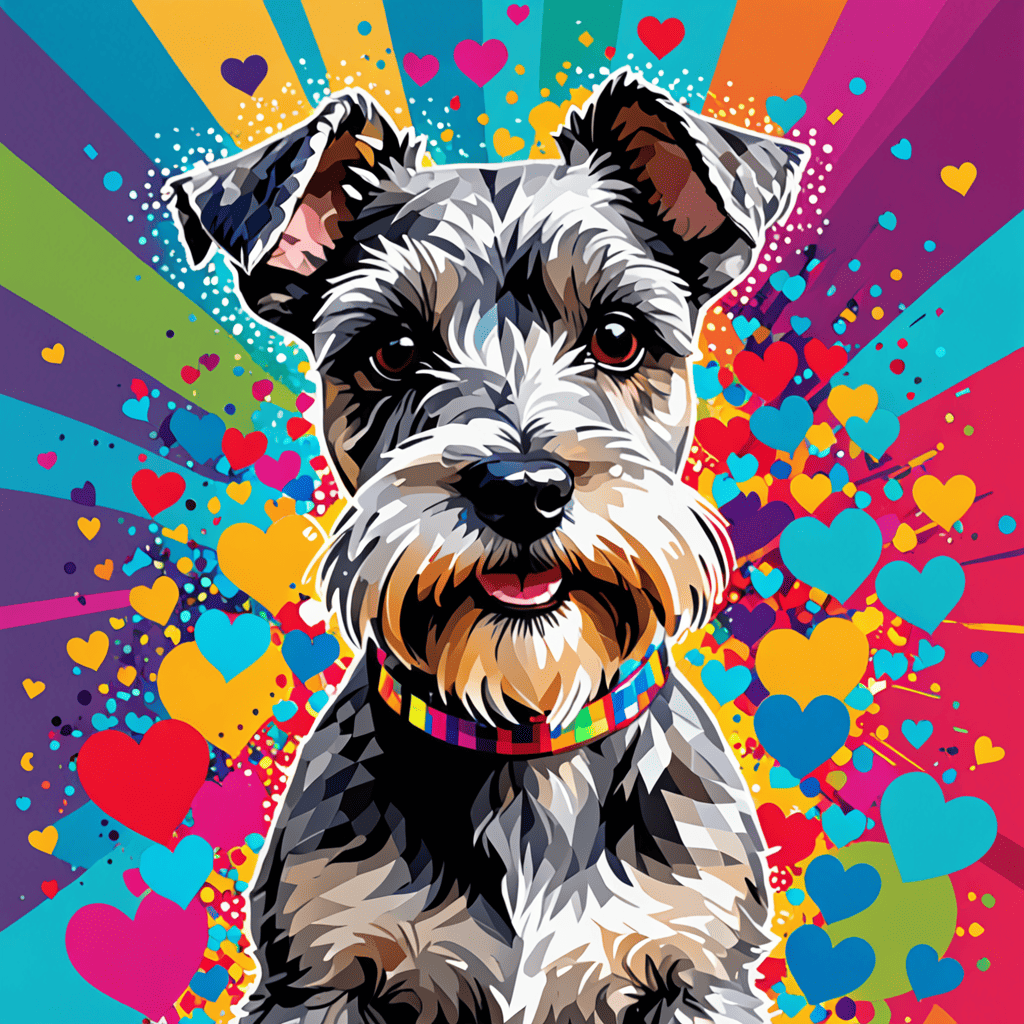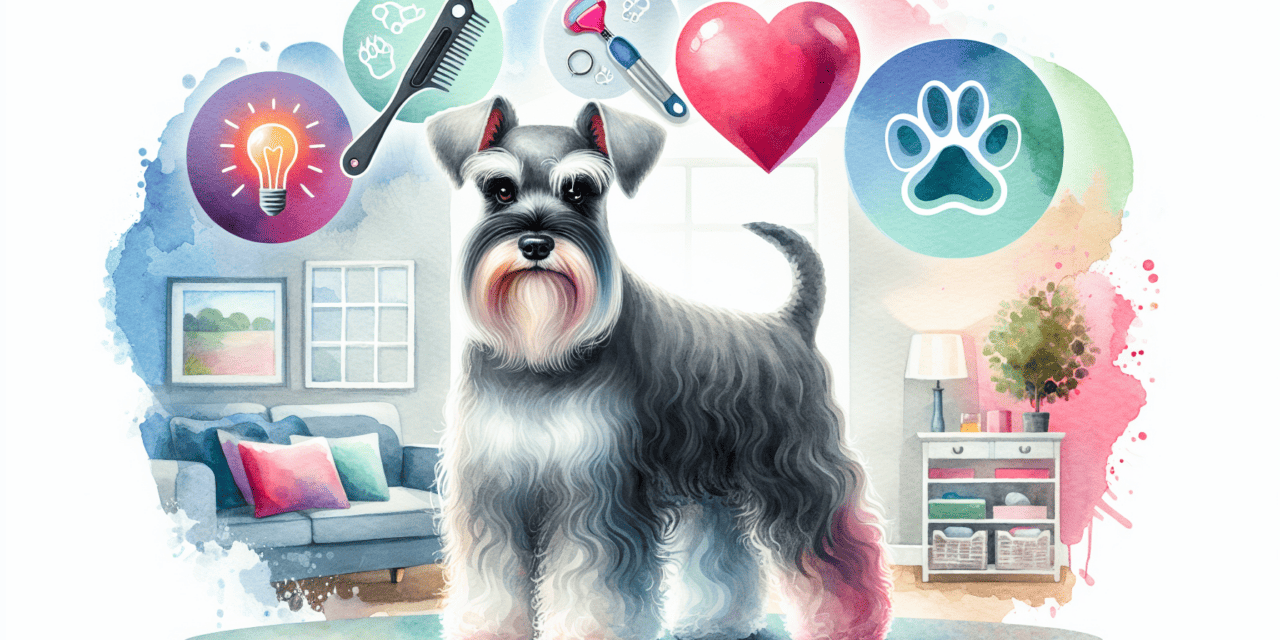Are you considering welcoming a mini schnauzer into your home? This charming breed, known for its distinctive beard and lively personality, has captured the hearts of many dog lovers. In this article, we will explore the truth about mini schnauzers, diving into the pros and cons of owning a miniature schnauzer dog. From understanding the challenges that come with this breed to uncovering their temperament and care needs, we aim to provide you with comprehensive insights. We’ll also address common questions such as, “Do all mini schnauzers bark a lot?” and “What do schnauzers love the most?” Whether you’re looking for a mini schnauzer puppy or considering adoption options, this guide will help you determine if a miniature schnauzer is the right fit for your lifestyle. Join us as we navigate the world of mini schnauzers and equip you with the knowledge to make an informed decision.
What are the cons of a Mini Schnauzer?
Understanding the Challenges of Mini Schnauzers
When considering the Miniature Schnauzer, it’s essential to be aware of several potential drawbacks associated with this breed:
1. **Vocalization**: Miniature Schnauzers are known for their tendency to bark frequently. This vocal behavior can be a nuisance, especially in apartment living or close-knit neighborhoods. Training can help mitigate excessive barking, but it requires consistent effort from the owner.
2. **Socialization Challenges**: While Miniature Schnauzers are generally friendly, they may not be the most dog-friendly breed. They can exhibit territorial behavior and may not always get along with other dogs, particularly if not properly socialized from a young age. Early socialization and exposure to various environments can help reduce this issue.
3. **Grooming Needs**: This breed has a distinctive wiry coat that requires regular grooming to prevent matting and maintain its appearance. Owners should be prepared for frequent brushing and professional grooming every few months, which can be time-consuming and costly.
4. **Training Requirements**: Miniature Schnauzers are intelligent and eager to learn, but they can also be stubborn. They thrive under firm, consistent training methods and may not respond well to harsh discipline. Patience and positive reinforcement techniques are crucial for effective training.
5. **Health Concerns**: Like many breeds, Miniature Schnauzers are prone to specific health issues, including hip dysplasia, pancreatitis, and certain skin conditions. Regular veterinary check-ups and a healthy diet are essential to mitigate these risks.
6. **Energy Levels**: While Miniature Schnauzers are playful and energetic, they require regular exercise to stay healthy and happy. Owners must commit to daily walks and playtime to prevent behavioral issues stemming from boredom or excess energy.
In summary, while Miniature Schnauzers can make wonderful companions, potential owners should consider these cons carefully. Proper training, socialization, and grooming are vital to ensuring a harmonious relationship with this breed. For more insights into dog training and wellness, resources like Wellness Coaching For Life can provide valuable guidance on maintaining a balanced lifestyle for both pets and their owners.
Common Misconceptions About Miniature Schnauzers
Despite their popularity, there are several misconceptions about Miniature Schnauzers that can lead to misunderstandings about their care and behavior:
1. **They Are Hypoallergenic**: Many people believe that Miniature Schnauzers are completely hypoallergenic due to their wiry coat. While they do shed less dander than some breeds, no dog is entirely hypoallergenic. Individuals with allergies should spend time with the breed before making a commitment.
2. **They Don’t Need Much Exercise**: Another common myth is that Miniature Schnauzers are low-energy dogs. In reality, they require regular exercise to stay healthy and prevent behavioral issues. Daily walks and playtime are essential to meet their energy needs.
3. **They Are Easy to Train**: While Miniature Schnauzers are intelligent, their stubbornness can make training a challenge. Owners must be prepared to invest time and patience into training sessions, utilizing positive reinforcement techniques for the best results.
4. **They Are Good with All Pets**: Some believe that Miniature Schnauzers will get along well with all other pets. However, their territorial nature can lead to conflicts, especially if they are not properly socialized. Early exposure to other animals is crucial for fostering a friendly demeanor.
Understanding these misconceptions can help potential owners make informed decisions about bringing a Miniature Schnauzer into their home. For more detailed information on pet care, visit our pet blog for articles related to wellness and training.

Are Mini Schnauzers Good Pets?
Yes, Miniature Schnauzers are excellent pets for various reasons:
- Friendly and Outgoing: Miniature Schnauzers are renowned for their friendly and sociable demeanor. They typically get along well with children and other pets, making them ideal family companions. Their playful nature encourages interaction, which can foster strong bonds within the family unit.
- Intelligent and Trainable: This breed is known for its high intelligence, ranking 12th in Stanley Coren’s list of the most intelligent dog breeds. Their eagerness to please makes them relatively easy to train. They excel in obedience training and can quickly learn commands, which is beneficial for first-time dog owners.
- Protective and Alert: Miniature Schnauzers are naturally protective and make excellent watchdogs. They are alert and will bark to alert their owners of any unusual activity, providing a sense of security for the household.
- Adaptable Size: Their small size (typically weighing between 11-20 pounds) allows them to adapt well to various living situations, including apartments and smaller homes. They require moderate exercise, making them suitable for owners with a busy lifestyle.
- Low Shedding: Miniature Schnauzers have a wiry coat that sheds minimally, which can be advantageous for allergy sufferers. Regular grooming is necessary to maintain their coat and minimize shedding.
- Health Considerations: While generally healthy, Miniature Schnauzers can be prone to certain health issues such as hip dysplasia and pancreatitis. Regular veterinary check-ups and a balanced diet can help mitigate these risks.
- Socialization Needs: Early socialization is crucial for Miniature Schnauzers to ensure they grow up to be well-rounded dogs. Engaging them in various activities and exposing them to different environments can enhance their social skills.
In conclusion, Miniature Schnauzers make great pets due to their friendly nature, intelligence, and adaptability. For more information on pet care and training, resources like the American Kennel Club and the Petfinder for adoption provide valuable insights.
The Temperament of Mini Schnauzers
Miniature Schnauzers possess a unique temperament that contributes to their popularity as family pets. They are known for being:
- Affectionate: These dogs thrive on companionship and enjoy being part of family activities. Their affectionate nature makes them great cuddle buddies.
- Playful: Mini Schnauzers have a playful spirit that keeps them active and engaged. They enjoy games and activities that stimulate their minds and bodies.
- Curious: Their inquisitive nature means they love exploring their surroundings, which can lead to entertaining antics.
- Stubborn at Times: While they are intelligent, Mini Schnauzers can exhibit a stubborn streak. Consistent training and positive reinforcement are essential to guide their behavior.
Understanding the temperament of Miniature Schnauzers helps potential owners prepare for the joys and challenges of having this breed as a pet. For more insights on caring for schnauzers, visit our homepage.
Mini Schnauzers as Family Pets: Pros and Cons
When considering Miniature Schnauzers as family pets, it’s important to weigh the pros and cons:
Pros:
- Great with children and other pets, fostering a harmonious household.
- Low shedding coat, making them suitable for allergy sufferers.
- Highly trainable, which is beneficial for families with varying experience levels in dog ownership.
Cons:
- Can be vocal, which may not be ideal for families seeking a quieter pet.
- Require regular grooming to maintain their coat, which can be time-consuming.
- May develop separation anxiety if left alone for extended periods.
By understanding these pros and cons, families can make informed decisions about welcoming a Miniature Schnauzer into their home. For more tips on pet wellness, check out our latest articles.
Are Mini Schnauzers High Maintenance?
Miniature Schnauzers are known for their lively personality and distinctive appearance, but they do require a certain level of maintenance to ensure their health and happiness. Here are key aspects to consider:
Grooming Needs of Miniature Schnauzers
Mini Schnauzers have a double coat that requires regular grooming to prevent matting and to maintain their characteristic look. It is recommended to groom them every 4 to 6 weeks, which includes trimming their beard, eyebrows, and body. Regular brushing (at least twice a week) is also essential to keep their coat healthy and to minimize shedding. For more detailed grooming tips, you can refer to the American Kennel Club.
Daily Care Requirements for a Mini Schnauzer Dog
Providing a balanced, age-appropriate diet is crucial for your Mini Schnauzer’s health. High-quality dog food that meets their specific nutritional needs can help prevent obesity, which is a common issue in this breed. Portion control is vital; consult your veterinarian for the appropriate serving sizes based on your dog’s age, weight, and activity level.
Mini Schnauzers are energetic dogs that require daily exercise to stay healthy and happy. Aim for at least 30 minutes of physical activity each day, which can include walks, playtime, or agility training. Regular exercise helps prevent behavioral issues that can arise from boredom.
Early training and socialization are essential for Mini Schnauzers. They are intelligent and eager to please, making them relatively easy to train. Positive reinforcement techniques work best. Socializing them with other dogs and people from a young age can help them develop into well-rounded pets.
Like all breeds, Mini Schnauzers are prone to certain health issues, including hip dysplasia, eye disorders, and skin conditions. Regular veterinary check-ups and vaccinations are important to catch any potential health problems early.
In conclusion, while Miniature Schnauzers do require a commitment to grooming, diet, exercise, and training, they can be wonderful companions for those willing to invest the time and effort. For more personalized guidance on maintaining your Mini Schnauzer’s health and well-being, consider consulting resources like Wellness Coaching For Life, which can provide tailored advice for dog owners.
Do All Mini Schnauzers Bark a Lot?
Miniature Schnauzers are known for their vocal nature, and many owners report that they do bark frequently. This behavior is largely attributed to their breed characteristics, as they were originally bred as working dogs to alert their owners to intruders. Here are some key points regarding their barking behavior:
- Barking as Communication: Miniature Schnauzers use barking as a primary form of communication. They may bark to express excitement, alert to potential threats, or seek attention. Understanding the context of their barking can help owners manage it effectively.
- Socialization and Training: Early socialization and consistent training can significantly influence a Miniature Schnauzer’s barking habits. Exposing them to various environments, people, and other animals can help reduce excessive barking. Positive reinforcement techniques, such as rewarding quiet behavior, can also be beneficial.
- Exercise Needs: Regular physical and mental exercise is crucial for Miniature Schnauzers. A well-exercised dog is less likely to bark out of boredom or pent-up energy. Activities such as daily walks, playtime, and interactive toys can help keep them engaged.
- Health Considerations: Sometimes, excessive barking can be a sign of underlying health issues, such as anxiety or discomfort. If a Miniature Schnauzer’s barking seems excessive or unusual, it is advisable to consult a veterinarian to rule out any medical concerns.
- Owner Expectations: Potential owners should be aware that while not all Miniature Schnauzers will bark excessively, many do have a tendency to be vocal. Setting realistic expectations and preparing for this aspect of their behavior is important for a harmonious relationship.
In summary, while Miniature Schnauzers are known to bark a lot, their barking can be managed through proper training, socialization, and exercise. Understanding their needs and behaviors can lead to a more peaceful coexistence. For further insights on managing dog behavior, resources such as the American Kennel Club provide valuable information.
Barking Behavior in Schnauzer Dogs
The barking behavior of Schnauzer dogs, particularly Miniature Schnauzers, can vary significantly based on individual temperament and upbringing. Here are some factors that influence their barking:
- Genetics: Some Mini Schnauzers may inherit a more vocal disposition from their lineage, making them more prone to barking.
- Environment: A noisy or busy environment can trigger more frequent barking. Miniature Schnauzers may bark at unfamiliar sounds or sights, making it essential to create a calm living space.
- Attention Seeking: Mini Schnauzers often bark to gain attention from their owners. Ensuring they receive adequate interaction and playtime can help mitigate this behavior.
Understanding these factors can help owners better manage their Mini Schnauzer’s barking tendencies, leading to a more enjoyable companionship.
Training Tips to Manage Barking in Mini Schnauzers
Training is essential for managing barking in Miniature Schnauzers. Here are some effective strategies:
- Positive Reinforcement: Reward your Mini Schnauzer when they remain quiet during situations that typically trigger barking. This encourages them to associate silence with positive outcomes.
- Consistent Commands: Use clear commands such as “quiet” or “enough” to signal when barking should stop. Consistency is key in reinforcing these commands.
- Desensitization: Gradually expose your Mini Schnauzer to the stimuli that trigger their barking. This can help them become accustomed to these triggers and reduce their reaction over time.
- Professional Training: If barking becomes unmanageable, consider enrolling your Mini Schnauzer in obedience classes. Professional trainers can provide tailored strategies to address specific barking issues.
By implementing these training tips, you can foster a more peaceful environment and strengthen your bond with your Miniature Schnauzer. For more tips on caring for Schnauzers, visit our homepage.

Does Mini Schnauzer Smell?
Understanding the odor issues associated with mini schnauzers is essential for any owner. While they are generally clean dogs, certain factors can contribute to a distinct smell. Here are some key reasons why your miniature schnauzer might develop an odor, along with effective solutions to keep them smelling fresh.
Understanding the Odor Issues with Miniature Schnauzers
Miniature Schnauzers can develop a distinct odor due to several factors, primarily linked to their skin and grooming needs. Here are key reasons why your miniature schnauzer dog might smell, along with effective solutions:
- Oily Skin: Miniature Schnauzers are genetically predisposed to having oily skin, which can lead to a buildup of sebum. This natural oil can create a unique smell and a greasy texture when touched. Regular grooming and bathing can help manage this issue.
- Ear Infections: Miniature Schnauzers are prone to ear infections, which can produce a foul odor. Regularly check and clean their ears to prevent infections. If you notice persistent odor or discharge, consult your veterinarian.
- Dental Health: Bad breath can contribute to an overall unpleasant smell. Ensure your mini schnauzer receives regular dental care, including brushing their teeth and professional cleanings as needed.
- Skin Conditions: Allergies, dermatitis, or other skin conditions can cause odor. If your dog has itchy or inflamed skin, it’s essential to consult a veterinarian for appropriate treatment options.
- Diet: The quality of your dog’s diet can affect their skin and coat health. A balanced diet rich in omega fatty acids can improve skin condition and reduce odor. Consider consulting with a veterinarian or a pet nutritionist for tailored dietary advice.
- Regular Grooming: Regular grooming is crucial for Miniature Schnauzers. Frequent brushing and bathing with appropriate dog shampoos can help control odors. Look for shampoos designed for oily skin or those that contain natural deodorizing ingredients.
- Hydration and Exercise: Ensure your Miniature Schnauzer stays hydrated and gets regular exercise. A healthy lifestyle can improve overall skin and coat health, reducing odor.
Maintaining a Fresh Environment for Your Mini Schnauzer
To keep your mini schnauzer smelling fresh, consider implementing the following tips:
- Regular Bathing: Bathe your miniature schnauzer every 4-6 weeks using a high-quality dog shampoo. This helps remove dirt and excess oils.
- Grooming Routine: Establish a grooming routine that includes brushing at least once a week to remove loose hair and debris.
- Ear Care: Clean your dog’s ears weekly with a vet-recommended ear cleaner to prevent infections.
- Dental Hygiene: Brush your mini schnauzer’s teeth regularly and provide dental chews to maintain oral health.
- Quality Diet: Feed your dog a high-quality diet that supports skin and coat health, which can help minimize odor.
For more detailed guidance on maintaining your Miniature Schnauzer’s hygiene and health, consider resources from reputable pet health organizations such as the American Kennel Club and the Vetstreet.
What do Schnauzers love the most?
Schnauzers, known for their distinctive bearded snouts and lively personalities, have a variety of loves that contribute to their well-being and happiness. Here are the key aspects that Schnauzers cherish the most:
1. **Family Interaction**: Schnauzers are highly social dogs that thrive on companionship. They form strong bonds with all family members, not just one person. This breed enjoys being involved in family activities, making them excellent companions for both adults and children. According to the American Kennel Club, Schnauzers are known for their affectionate nature and loyalty to their families.
2. **Playtime and Exercise**: Schnauzers are energetic and playful. They love engaging in physical activities such as fetch, agility training, and long walks. Regular exercise is crucial for their mental and physical health. A study published in the Journal of Veterinary Behavior emphasizes the importance of daily exercise for preventing behavioral issues in dogs.
3. **Mental Stimulation**: These intelligent dogs thrive on mental challenges. Schnauzers enjoy puzzle toys, obedience training, and interactive games that stimulate their minds. Engaging them in training sessions not only strengthens their bond with their owners but also enhances their cognitive abilities.
4. **Socialization**: Schnauzers love to socialize with other dogs and people. Early socialization is vital for them to develop into well-rounded adults. The American Kennel Club recommends exposing Schnauzers to various environments, sounds, and experiences during their formative months.
5. **Affection and Attention**: Schnauzers crave affection and attention from their owners. They enjoy cuddling and being close to their humans. Providing them with love and attention helps reinforce their bond and ensures they feel secure and happy.
6. **Healthy Treats**: Like many dogs, Schnauzers have a fondness for tasty treats. However, it’s essential to provide them with healthy options that support their overall health. Incorporating wellness coaching principles can help owners choose the right diet and treats that align with their Schnauzer’s nutritional needs.
7. **Routine and Structure**: Schnauzers thrive on routine. They appreciate having a structured daily schedule that includes feeding, walks, playtime, and training sessions. Consistency helps them feel secure and reduces anxiety.
8. **Grooming**: Schnauzers have a unique coat that requires regular grooming. They often enjoy the attention that comes with grooming sessions, which can also serve as a bonding experience between the dog and owner.
9. **Being Active Participants**: Schnauzers love to be involved in their owners’ lives. Whether it’s accompanying them on errands or participating in family outings, they enjoy being active participants in daily activities.
By understanding these aspects of what Schnauzers love, owners can create a fulfilling environment that caters to their needs, ensuring a happy and healthy life for their furry companions. For more insights on dog care and training, resources like the American Kennel Club and veterinary behavior studies can provide valuable information.
Activities and Toys That Mini Schnauzers Enjoy
Mini Schnauzers thrive on a variety of activities and toys that cater to their energetic and playful nature. Here are some favorites:
– **Fetch**: This classic game is a favorite among Schnauzers. Using a ball or a favorite toy, you can engage your Mini Schnauzer in a fun game of fetch, which also provides excellent exercise.
– **Agility Training**: Schnauzers excel in agility courses. Setting up a simple course in your backyard can provide both physical and mental stimulation, allowing them to showcase their intelligence and athleticism.
– **Interactive Toys**: Puzzle toys that dispense treats can keep your Mini Schnauzer entertained for hours. These toys challenge their minds and encourage problem-solving skills.
– **Social Playdates**: Organizing playdates with other dogs can fulfill their social needs. Schnauzers enjoy interacting with their peers, which helps them develop good social skills.
– **Long Walks**: Regular walks are essential for their physical health. Schnauzers enjoy exploring new environments, so varying your walking routes can keep them engaged.
By incorporating these activities and toys into your Mini Schnauzer’s routine, you can ensure they remain happy, healthy, and well-stimulated.
Building a Bond with Your Miniature Schnauzer Dog
Building a strong bond with your Miniature Schnauzer requires time, patience, and understanding. Here are effective ways to strengthen your relationship:
– **Consistent Training**: Engaging in regular training sessions not only teaches your Mini Schnauzer commands but also strengthens your bond. Positive reinforcement techniques can enhance trust and respect.
– **Quality Time**: Spend quality time together through play, walks, or simply cuddling. This time fosters a deeper connection and helps your Schnauzer feel secure.
– **Routine Care**: Regular grooming and health check-ups are essential. Schnauzers often enjoy the attention during grooming sessions, which can be a bonding experience.
– **Understanding Their Needs**: Pay attention to your Mini Schnauzer’s preferences and behaviors. Understanding their likes and dislikes helps you cater to their emotional and physical needs effectively.
– **Socialization**: Expose your Mini Schnauzer to various environments, people, and other pets. This exposure helps them become well-adjusted and confident, further enhancing your bond.
By focusing on these strategies, you can cultivate a loving and trusting relationship with your Miniature Schnauzer, ensuring a fulfilling companionship for both of you. For more tips on caring for Schnauzers, visit Wellness Coaching For Life.
Mini Schnauzers for Sale and Adoption Options
When considering adding a mini schnauzer to your family, understanding the various avenues for acquiring one is essential. Whether you are looking for a miniature schnauzer for sale or seeking to adopt a miniature schnauzer, there are important factors to consider to ensure you find a healthy and happy pup.
Finding Miniature Schnauzers for Sale: What to Consider
When searching for mini schnauzers for sale, it’s crucial to choose reputable sources. Here are some key considerations:
- Reputable Breeders: Look for breeders who are registered with organizations like the American Kennel Club. They should provide health clearances and be willing to answer any questions about the puppy’s lineage.
- Health Testing: Ensure that the breeder conducts health tests on their breeding dogs to minimize the risk of genetic disorders common in miniature schnauzers.
- Visit the Facility: If possible, visit the breeder’s facility to see the living conditions of the puppies and their parents. A clean, well-maintained environment is a good sign.
- Ask for References: Speak to previous customers to gauge their experiences with the breeder and the health and temperament of their dogs.
Additionally, consider the price range for mini schnauzer puppies for sale, which can vary significantly based on location, breeder reputation, and the puppy’s lineage.
Mini Schnauzer Rescue Organizations and Adoption Resources
If you prefer to adopt rather than buy, there are many mini schnauzer rescue organizations dedicated to finding homes for these dogs. Here are some resources to help you:
- Local Shelters: Check your local animal shelters or humane societies, as they often have schnauzers for adoption and can provide information on available dogs.
- Rescue Groups: Organizations like the ASPCA and breed-specific rescues focus on rehoming miniature schnauzers. They can help match you with a dog that fits your lifestyle.
- Online Adoption Platforms: Websites like Petfinder allow you to search for mini schnauzers for adoption in your area, providing details about each dog’s background and needs.
Adopting a mini schnauzer not only gives a dog a second chance but can also be a more affordable option compared to purchasing from a breeder. Always ensure that you are ready for the commitment of pet ownership, including the time, effort, and resources required to care for your new furry friend.













